is a 9V ecuador visa is same as permanent resident visa?
Dear friends, thanks in advance for your patience . my queries are:
1. is a 9V Ecuador visa a permanent resident visa? can we call it Ecuador PR?
2. is a 9V visa holder eligible to apply for an Ecuador passport? ifso, how long aftergetting a 9V visa?
Thanks
ramk_19 wrote:1. is a 9V Ecuador visa a permanent resident visa?...
2. is a 9V visa holder eligible to apply for an Ecuador passport? if so, how long after getting a 9V visa?
The 9-V is the professional visa, which is a permanent-residency visa.
It requires that the applicant hold a degree from a university recognized on the official EC government list.
Three years after obtaining a permanent-residency visa, an Expat may apply for citizenship -- including an EC passport.
The official website for permanent-visa information is:
cancilleria.gob.ec/visas-inmigrante/?lang=en
A guide to the 9-V visa was produced from copious amounts of research and is posted at cuencacultureshock.com ... You will find a link to the "Senescyt" list of approved universities at that website as well.
cccmedia in Quito
cccmedia wrote:The 9-V is the professional visa, which is a permanent-residency visa. It requires that the applicant hold a degree from a university recognized on the official EC government list.
I've read the site linked and other resources and have never understood what sort of "profession" supports this visa application, but have the impression it refers to engineering, natural sciences, mathematics and similar degrees. Do you know what degrees support a "professional" visa? Or, where is "the list"?
SawMan wrote:I've read the (Cancillería) website linked and other resources and have never understood what sort of "profession" supports this visa application, but have the impression it refers to engineering, natural sciences, mathematics and similar degrees. Do you know what degrees support a "professional" visa? Or, where is "the list"?
According to that 9-V visa guide at cuencacultureshock.com, a bachelor's degree is sufficient for the purpose of obtaining a residency visa, and there is no mention of there being any restriction to engineering, math or the sciences.
The cuenca/shock website link that supposedly goes to the list of acceptable universities DOES take you to an EC education website. But that site is in Spanish and IMO is not user-friendly.
So if anyone can figure out how to use that site to access the list of universities whose degrees can be applied to the residency-visa process, please post what you've learned.
cccmedia in Quito
As of today at least, the link for the list of acceptable universities is a PDF file at:
http://www.educacionsuperior.gob.ec/wp- … 13-011.pdf
Just in case, the link is also available from this Facebook page:
facebook.com/permalink.php?id=154182398097351&story_fbid=205203996353338
Well done, Professor Archer. 
What if the University is not on the list ?
And the University is under the Govt of a country , not a private University !
Any clues ?
I obtained a professional residency visa last year and was told that if your college/university is not on the list, application can still be made. It's just another step. This information was mentioned by the Visa Facilatator I used.
After approval of Professional visa , can we exit Ecuador without any time limit ?
Or is there a law that would cancel the Permanent Residency if stayed for longer periods out of Ecuador ?
And most importantly , would I have to give up my previous citizenship if I wish to get Ecuadorian Passport ?
It is my understanding that all permanent residency visas have the same requirements. The first two years you can only be out of the country for 90 days each year. After that it's 18 months. Residency and citizenship are not the same. I am a U.S. citizen but am an Ecuadorian resident. If I want after three years of residency I can apply for Citizenship in Ecuador. I also can keep my US citizenship and become a dual Citizen.
Subela wrote:The first two years you can only be out of the country for 90 days each year. After that it's 18 months. Residency and citizenship are not the same. I am a U.S. citizen but am an Ecuadorian resident. If I want after three years of residency I can apply for Citizenship in Ecuador. I also can keep my US citizenship and become a dual Citizen.
Good answer, Subela 
One can also renounce U.S. citizenship after obtaining EC citizenship. The fee for renouncing was just raised to $2,350.
For John Templeton, it was worth it. The famed investor and philanthropist (1912-2008) gave over a billion dollars to charity. This included an extra 100 million for charity that he was able to avoid paying to the IRS by renouncing his U.S. citizenship. He renounced in 1964 and lived year-round in the Bahamas. (wikipedia)
cccmedia in Quito
Yes, I remember reading recently that the cost of denouncing your citizenship in the US has gone up.
Subela wrote:Yes, I remember reading recently that the cost of denouncing your citizenship in the US has gone up.
Make that REnouncing. Until last year, it was a fee of several hundred dollars.
Renouncements more than doubled in a single year, 2013, followed by the sudden 422 percent fee hike.
Of course, most of the renouncers are wealthy fatcats trying to avoid federal FATCAts.
cccmedia in Quito
cccmedia wrote:Subela wrote:Yes, I remember reading recently that the cost of denouncing your citizenship in the US has gone up.
Make that REnouncing. Until last year, it was a fee of several hundred dollars.
Renouncements more than doubled in a single year, 2013, followed by the sudden 422 percent fee hike.
Of course, most of the renouncers are wealthy fatcats trying to avoid federal FATCAts.
cccmedia in Quito
I love your posts ccc and am not being defensive here, but it's not wealthy folks by and large that are denouncing U.S. citizenship. First of all, doing so for wealthy taxpayers subjects them to an "exit tax" most Americans would not have to pay. This is basically a tax on unrealized gains by "pretending" the taxpayer sold all of his/her/their assets and were taxed at normal tax rates on their gains. This is a huge disincentive for wealth Americans to denounce their citizenship and very few do.
Instead, the vast majority of U.S. citizenship denouncements are by so-called "inadvertent citizens." As a basic premise, one born in the US is typically automatically a US citizen. Accordingly, citizenship may fortuitously and inadvertently be acquired by one whose parents were in transit through or who were otherwise only temporarily present in the US. Correspondingly, US citizenship may also be automatically acquired by one born outside the US whose parents were both US citizens or even if only one parent was a US citizen. This occurs where the citizen-parent meets certain relatively modest conditions relating to prior residence in the US.
Despite inadvertent acquisition of citizenship, the US tax-compliance considerations for the inadvertent citizen remain the same as with those applicable to the sedentary citizen living solely in the US. Moreover, due to the absence of US connections and the presence of more significant foreign connections, the attendant compliance considerations may be more complex than otherwise. These include reporting interests in foreign accounts, corporations, partnerships, trusts, etc. In addition, without any real link to the US, the inadvertent citizen may not even be aware of the necessity of compliance. The result may lead not only to the imposition of substantial tax deficiencies, but also to severe penalties and interest charges, or even prosecution for criminal tax fraud.
Hi
One of the attorney told me this
option for you to consider is a “Visa Via-Cable”, where I simply process your visa for you without you having first come to Ecuador
So can a legal attorney do this ?
And a important question , if I'm employed in a foreign country or I'm studying in a foreign country , could I use that reason to justify my absense for more than 90 days ?
Kindly advise ☺😅
Arabian Knight wrote:One of the attorneys told me this option for you to consider is a “Visa Via-Cable”, where I simply process your visa for you without you having first come to Ecuador.
The question of obtaining a residency visa without entering Ecuador to do it arose in a recent exchange among MikeGB, Top Cat and me on the "Visa Pipeline" thread (see especially reports 26 and 27).
I quoted there from the Ecuadorian Embassy (Washington, D.C.) website which said that the applicant must be in Ecuador to submit the application and could not do so through a consulate.
Mike then suggested the possibility of assigning power-of-attorney to someone in Ecuador (possibly an attorney) to submit the application along with the paperwork provided by the applicant. Mike conceded this could be a risky path.
That discussion was not specifically related to someone in Saudi Arabia such as this poster. So in the case being discussed on this thread, a visit to the website of the Ecuadorian embassy nearest to the poster might be the next step to consider.
cccmedia in Quito
Arabian Knight wrote:if I'm employed in a foreign country or I'm studying in a foreign country , could I use that reason to justify my absence for more than 90 days ?
For a hardship exception to granted, you would have to get approval -- done on a case-by-case basis -- from the Cancillería.
Their website for official visa information is:
cancilleria.gob.ec/visas-inmigrantes/?lang=en
cccmedia in Quito
SawMan wrote:First of all, doing so (renouncing) for wealthy taxpayers subjects them to an "exit tax" most Americans would not have to pay. This is basically a tax on unrealized gains by "pretending" the taxpayer sold all of his/her/their assets and were taxed at normal tax rates on their gains. This is a huge disincentive for wealthy Americans to denounce their citizenship and very few do.
Instead, the vast majority of U.S. citizenship denouncements are by so-called "inadvertent citizens."
Based on my research, the specific reasons individuals renounce are not disclosed publicly as a rule.
You might think that SawMan's logic is correct, that the exit tax, aka expatriate tax, would be a huge disincentive to renounce citizenship.
However, I'm still of the opinion that the majority of renunciants are wealthy people shielding that wealth.
This Wikipedia entry indicates that there is an outrage factor that may be trumping any disincentive:
"The mayor of London, Boris Johnson, renounced his U.S. citizenship after the IRS taxed the sale of his house in London. Outrage at such events has caused the numbers renouncing U.S. citizenship to triple...."
Does anyone doubt that there's been outrage in recent years over FATCA [foreign tax-compliance regulations covering U.S. citizens] and other IRS over-reaching?
Have y'all noticed that the promotions for second passports hype the wealth-shielding tax benefits and typically make no specific pitch to inadvertant citizens?
The steep annual increases in renunciants have not been explained to my satisfaction as being tied to any steep increase in the population of inadvertants, although I agree they exist. (My father was one -- born 90-some years ago as a "British subject" on a ship flying the British flag, although the vessel had already left the U.K. for the U.S. before the birth.)
The expat-tax is a real thing, but smart and wealthy people may have already strategically sold their assets (except maybe their house) or have attorneys who can help them with other ways to legally avoid exposing assets to the tax.
It may be worth it to the wealthy to take a one-time capital gains hit on their residence -- while using primary-residence tax-exclusions to offset -- in order to shelter greater expected earnings of future years.
cccmedia in Quito
Arabian Knight wrote:One of the attorneys told me this option for you to consider is a “Visa Via-Cable”, where (they) simply process your visa for you without you having first come to Ecuador.
The company Gringo Visas has been offering a service to departing U.S. citizens to obtain an EC residency visa before traveling to Ecuador.
By maintaining offices in Cuenca, Quito and the United States, the company says it is uniquely able to accept a residency-visa application in the United States and obtain an EC visa for its clients. Apparently, the visa is processed in Ecuador to avoid the current prohibition against submitting the ap at a consulate, although the applicant picks up the visa at the nearest consulate in the U.S.
I do not have information, however, as to how our Arabian friend could find such a service suiting his nationality.
source: gringovisas.com
cccmedia in Quito
Hi cccmedia and all other folks,
I have been delaying obtaining my authentifications for required residency visa documentation - such as provincial and federal criminal check - because of some idea I must have gotten long ago on the blogsites. I somehow got the idea that the authentifications would be invalid if they were too aged - i.e. that they have to be done within a certain amount of time, or the residency visa application lapses.
In Canada we do not have apostille so documents must be authenticated by Department of Foreign Affairs (formerly DFAIT).
Could you kindly tell me about this if you know?
Many thanks from Ottawa, where all is fast becoming green and this week the températures were magically very similar to those in Loja.
Helen Pivoine
Helen, this is just the type of info to get straight from the horse's mouth, especially since you're in Canada's national capital.
And by the horse's mouth I mean the Ecuadorian embassy or consulate in Ottawa.
cccmedia in Ecuador's national capital
So where are Americas universities?
Next23 wrote:So where are Americas universities?
If you're asking to see the list of universities and colleges that are on Ecuador's approved-list for professional visa applicants, the list has been posted on this forum.
Just type the words university list into the Search Expat.com box atop this page and then click on the search icon to the right of the box.
cccmedia in Quito
I may be doing something wrong I saw many countries but not the US?
Make your relocation easier with the Ecuador expat guide
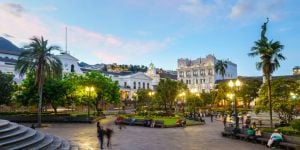
Work in Ecuador
Ecuador is famous as a retirement haven. But you might not want to wait until retirement age to move there and ...

Healthcare in Ecuador
Ecuador, as a fast-developing nation, has laws that are constantly evolving, but one thing is certain: the ongoing ...

Food in Ecuador
What kind of food will you find in restaurants, cafes, and private homes in Ecuador? Many restaurants in Ecuador ...

Leisure activities in Ecuador
You have made it to Ecuador, now what is there to do in your free time? A lifetime in Ecuador isn't enough time to ...
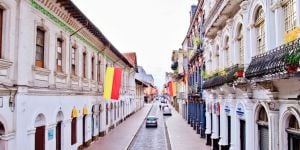
Work in Cuenca
There is no doubt that the Spanish colonial city of Cuenca is a wonderful place to call home, as demonstrated by ...
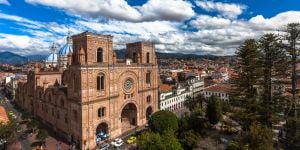
Accommodation in Cuenca
The rose-colored lenses through which potential expats have been made to view Cuenca often blur how the real ...
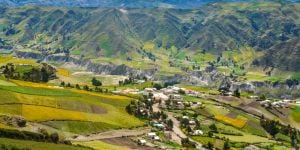
Family and children in Ecuador
Family is everything to an Ecuadorian. The extended family unit is the most important aspect of life in Ecuador, ...
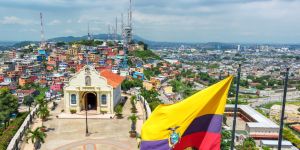
Setting up a business in Ecuador
Forum topics on visas in Ecuador




